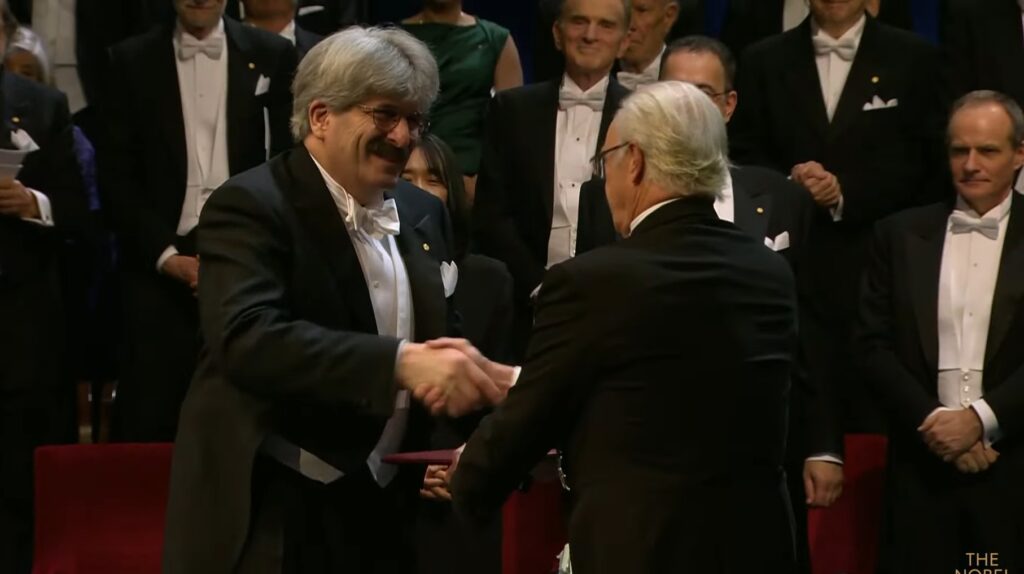Acemoglu
Daron Acemoglu shakes the hand of Sweden's King King Carl XVI Gustaf at the 2024 Nobel Prize Ceremony in Oslo. Youtube Screenshot
PHOTO: Daron Acemoglu shakes the hand of Sweden’s King Carl XVI Gustaf at the 2024 Nobel Prize Ceremony in Oslo. Youtube Screenshot
Tuesday’s Nobel Prize Ceremony in Sweden, had two winners in attendance from Newton—Daron Acemoglu won the Nobel Prize in Economic Sciences and Gary Ruvkun won the Nobel Prize in Medicine—bringing hometown pride to the world stage.
It was a regal affair at the Stockholm Concert Hall. King Carl XVI Gustaf and the rest of the royal family were there, on stage and in the front row, and the ceremony began with a performance by Sweden’s Royal Philharmonic Orchestra.
Winners, honored for their contributions to the progress of humanity, come from a wide variety of fields, ranging from artificial intelligence to poetry.
“Science, literature and peace offer different paths to tackle today’s wicked problems, but they all remind us that it is not blind destiny that decides on our future as humanity,” Nobel Prize Foundation Chair Astrid Soderbergh Widding said. “This offers hope. It lies in our hands to change the world.”
Ruvkun, a researcher with Massachusetts General Hospital and genetics professor at Harvard Medical School, along with Victor Ambros of UMass Medical School, received the prize for work that led to the discovery of microRNA and how it impacts genetic function.
Messenger RNA, commonly called mRNA, is a single-stranded molecule that is needed to synthesize proteins and contains a genetic sequence that, when making mRNA vaccines like the ones used against COVID-19, is then spliced and part of that sequence is encoded into a protein.
Professor Rickard Sandberg, of the Nobel Assembly at Karolinska Institutet, used a musical analogy as he presented the duo with their prize, comparing the concert hall to a human cell and each member of the orchestra a different DNA component.
“MicroRNAs are conductors with a special ability. Instead of passionately making gestures to either amplify or dampen music intensity, microRNAs tell musicians only when to quiet down or take a break.”

Acemoglu’s Nobel Prize in Economic Sciences, which he won alongside economists Simon Johnson and James Robinson, was for their thorough examination of wealth disparity between various nations and former colonies.
Acemoglu was born in Turkey, studied in London, and has taught at the Massachusetts Institute of Technology for more than 30 years. He received the John Bates Clark Medal in 2005.
His work with Johnson and Robinson explains that differences in prosperity between nations is related to the societal institutions introduced during European colonization.
“Some countries become trapped in a situation with extractive institutions and low economic growth,” the Nobel Prize website reads. “The introduction of inclusive institutions would create long-term benefits for everyone, but extractive institutions provide short-term gains for the people in power. As long as the political system guarantees they will remain in control, no one will trust their promises of future economic reforms. According to the laureates, this is why no improvement occurs.”
The Nobel was presented by Professor Jan Teorell, who noted Sweden’s prosperity and social institutions benefitting everyone (a social democracy).
“Sweden has it all. So, if you come from a country like Sweden, you might think it obvious that institutions matter for growth,” Teorell said. “But because we have it all, this is actually far from obvious. How can we be so sure it’s not the other way around? Maybe we have these inclusive institutions because of economic prosperity?”
Teorell discussed the prize-winning trio’s empirical approach to studying different nations’ histories, institutions and more to get a deeper understanding of how colonialism has affected colonial states and how social equality and inclusive benefit can dramatically change a nation’s path forward.
“Not far from here in December 1918, the Swedish parliament, on a late Tuesday night just about as cold as this one, adopted an important government bill that secured both female and equal suffrage to the Swedish population,” Teorell said as one example. “This particular decision can be seen as the completion of a lengthy process of reforms of both the economic and political institutions of Sweden.”
You can watch the entire Nobel Prize 2024 Ceremony on Youtube.